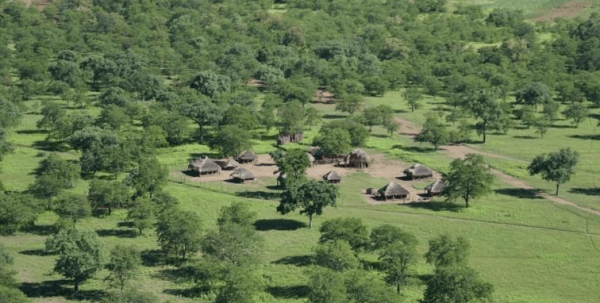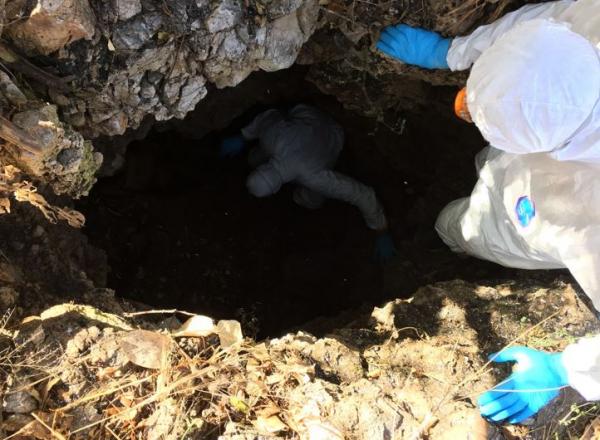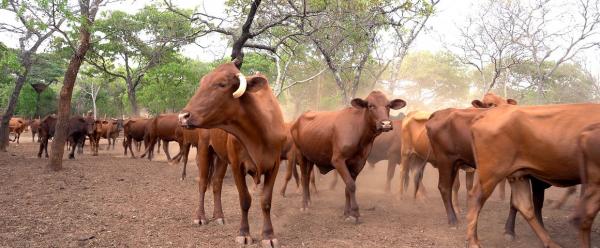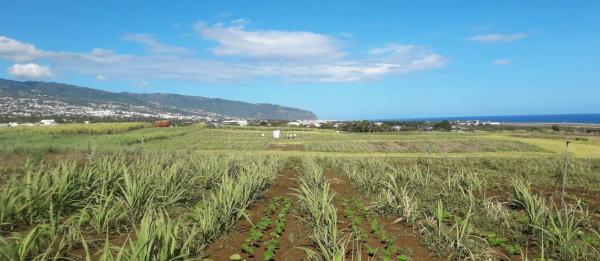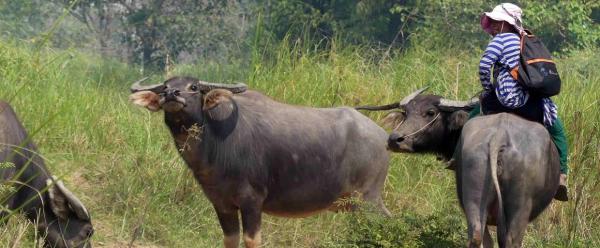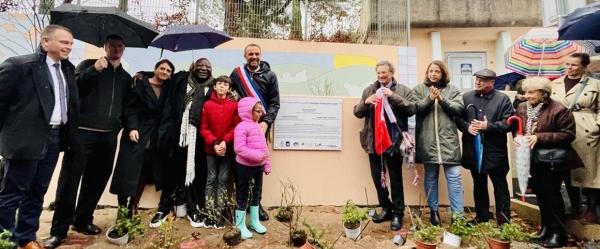CIRAD started its journey in 1993 in the Masvingo province with the “ Goat production in communal lands” project and a study on the comparative ecology of cattle and wild herbivores in an extensive mixed ranch area near Kadoma. In 1996, it implemented the first FGEF project called the Biodiversity Conservation and Sustainable Development in the Mid-Zambezi Valley “Zviwanikwa Zvemudande Inhaka" to conserve biodiversity and improve the living standards of communities in the middle Zambezi Valley. Since, CIRAD and its partners have considerably extended the research domains : management and sustainable use of natural resources ; wildlife conservation and management of protected areas, governance systems, regional and local policies in Trans-frontier Conservation Areas (TFACs); improving food security and the living standards of rural communities, by diversifying their production strategies ; resilient agriculture and climate change ; agroecological transition, climate smart agriculture, farming and natural resource management ; animal health, epidemiology and breeding, emerging diseases, zoonoses and the promotion of the One Health approach.
With national and regional partners, we are working to increase the resilience of rural populations to climate change, while developing healthy and sustainable farming systems in a context of high biodiversity conservation.
Elisabeth Claverie de Saint Martin
PDG du Cirad
Since the 2000s, the amount of food and wealth produced by the Zimbabwean agricultural sector, once highly productive, has been greatly reduced. The structure of the agricultural system has shifted from large-scale commercial farms to small-scale farming requesting a support adapted to these new producers’ needs in order to strengthen food security, reduce poverty and achieve an acceptable level of agricultural production. An important step is to promote sustainable food productions of the small-scale farmers and reduce rural household vulnerability to climatic hazards (droughts), increase their resilience to external shocks by diversifying sources of food and incomes, and integrate their production into profitable market systems.
Combining protected and conservation areas with agricultural sector
75% of the communal land lie in Agro -ecological Regions IV and V, often near national parks or safari areas. These regions host the poorest small-scale farmers, who need to be supported in order to participate in the national economy and adapt their strategies to the particular contexts of living at the periphery of protected areas. To achieve this objective, the agricultural sector requires strong, participatory and pro-active applied agricultural and environmental research to develop and adapt agricultural tools to this specific context, in line with Zimbabwean government policies and agro-ecological specificities.
In response to these challenges, CIRAD has been carrying out applied research and development projects without interruption, even during the period of macroeconomic instability and hyperinflation when the poverty increased in rural areas. During these three decades, CIRAD has built numerous collaborations with Zimbabwean Universities, governmental agencies and technical services.
The Research Platform “Production and Conservation in Partnership"
The RP-PCP (Research Platform “Production and Conservation in Partnership”) is the result of this long-term partnership in agricultural and ecological research for development and conservation. Established in 2007, the overall objective of the RP-PCP is to strengthen regional and national skills to foster more effectively the coexistence between local lifestyles and biodiversity conservation in areas with strong interfaces between protected areas and communal areas, wildlife / livestock and people. To this end, the highly innovative platform brings together the main Zimbabwean universities (University of Zimbabwe -UZ and National University of Science and Technology - NUST, Chinhoyi University of Technology – CUT and Bindura University of Science Education - BUSE), the French National Centre for Scientific Research (CNRS), the IRD and the CIRAD. It promotes demand driven research, capacity building through research and fosters the participative involvement of the local communities and stakeholders. It also tackles some of the most challenging issues in Southern Africa such as conflicts over access to natural resources, food security in communal areas and the emergence of animal and human diseases.
Over the years, CIRAD and its partners have achieved numerous milestones and successes through the RP-PCP:
• more than 1180 scientific articles and book chapters published ,
• creation of two research stations in peripheries of Hwange and Gonarezhou national Parks,
• CIRAD and Zim Parks designed, in 1999, the protocol of ground game count in Hwange national parks which is still used today,
• CIRAD and Zim Parks restored the vegetation survey started in 1980 in Hwange national park to provide more than 40 years of data on vegetation dynamic in the park
• creation of the first communal game ranch in the Zimbabwe
• numerous symposia on a number of interventions implements by CIRAD and partners
• promote sustainable use and harvest of game meat in rural areas where local communities had poor access to animal protein.
Examples of projects:
In the periphery of protected areas
The project is being implemented at eight sites in Africa, the Caribbean and the Pacific, and aims to protect both wildlife and the food security of local people. CIRAD is working in three countries: Gabon, Zambia and Zimbabwe.
The goal of the project is to strengthen the sustainable management of four sites within transfrontier conservation areas in southern Africa, through local development that is respectful of biodiversity, while altering the role and attitude of communities in the collective management of those areas.
In animal disease surveillance and control
CIRAD is exploring the contribution of agroecological practices to climate change adaptation and mitigation for smallholder farmers in sub-humid to semi-arid Zimbabwe. In-depth on-station experiments and in the field ones, jointly with farmers, have generated crucial insights on the soil and plant processes that help adapt and mitigate climate change, and on how these results can be adapted to farmers circumstances.
The PACMAN project aims to set up a biotechnology platform hosted by the University of Zimbabwe, to increase the country’s autonomy in the diagnosis of animal, plant and zoonotic diseases.
The LIPS-Zim project, funded by the European Union, has just been officially launched. As part of a consortium of four partners, CIRAD will work to strengthen animal disease surveillance and control systems, as well as to develop more resilient livestock production systems. The goal is to reduce livestock mortality, for more productive livestock systems that are adapted to the increase in the severity of drought events due to climate change.
In agroecology
CIRAD is exploring the contribution of agroecological practices to climate change adaptation and mitigation for smallholder farmers in sub-humid to semi-arid Zimbabwe. In-depth on-station experiments and in the field ones, jointly with farmers, have generated crucial insights on the soil and plant processes that help adapt and mitigate climate change, and on how these results can be adapted to farmers circumstances.
The goal of the project “Building resilience through ecological intensification in Zimbabwe” is to develop and implement scientifically tested agroecological approaches to improve agricultural production and climate change resilience, while protecting the environment and reducing greenhouse gas emissions.
The overall goal of IntercropValuES, a large-scale action research project, is to exploit and enhance the benefits (and ecosystem services) of intercropping in order to design agroecological cropping systems that are more productive, diversified, resilient and environmentally friendly, while being less dependent on external inputs (mineral fertilisers and pesticides) than current systems. These new cropping systems will also need to be acceptable to farmers and agri-food chain actors.
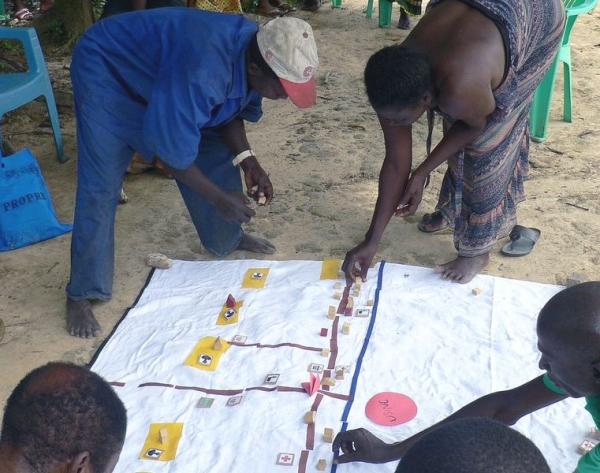

























-rec.jpg)
